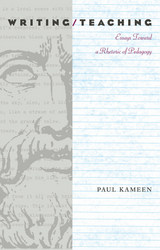
In Re-reading Poets, Paul Kameen offers a deep reflection on the importance of poets and poetry to the reader. Through his historical, philosophical, scholarly, and personal commentary on select poems, Kameen reveals how these works have helped him form a personal connection to each individual poet. He relates their profound impact not only on his own life spent reading, teaching, and writing poetry, but also their potential to influence the lives of readers at every level.
In an examination of works by William Wordsworth, Samuel Taylor Coleridge, Walt Whitman, and others, Kameen seeks to sense each author’s way of seeing, so that author and reader may meet in a middle ground outside of their own entities where life and art merge in deeply intimate ways. Kameen counters ideologies such as New Criticism and poststructuralism that marginalize the author, and instead focuses on the author as a vital presence in the interpretive process. He analyzes how readers look to the past via “tradition,” conceptualizing history in ways that pre-process texts and make it difficult to connect directly to authors. In this vein, Kameen employs examples from T. S. Eliot, Martin Heidegger, and Mikhail Bakhtin.
Kameen examines how people become poets and how that relates to the process of actually writing poems. He tells of his own evolution as a poet and argues for poetry as a means to an end beyond the poetic, rather than an end in itself. In Re-reading Poets, Kameen’s goal is not to create a new dictum for teaching poetry, but rather to extend poetry’s appeal to an audience far beyond academic walls.

2001 CCCC Outstanding Book Award
The vast majority of academic books are written from the scholar’s position, even those that primarily concern teaching. Writing/Teaching, on the other hand, is a book about teaching written from the position of the teacher. As the title suggests, Kameen’s book is split into two halves—yet both, in different ways and through different discourses, are derived from his work in the classroom, and his own struggle with issues and problems all teachers of writing must face.
The first half is a series of essays originating from a graduate seminar Kameen team-taught with professor and poet Toi Derricotte in 1994. Included are essays Kameen wrote, a selection of pieces written by other members of the group, and a reflective “postscript.” These essays combine personal narrative, reflective meditation, and critical inquiry—all used as discourse to depict and examine the process of teaching.
The second half of the book contains essays on Plato’s dialogues—primarily Phaedrus and Protagoras—as a means to interrogate the position of teacher through the lens of the most famous of Western pedagogues—Socrates. Here, Socrates is used as a tool to examine and critique both Kameen’s own teacherly identity and, in a wider sense, the set of cultural forces that pre-figure the available positions for both “teacher” and “student” in contemporary education.
What unites both halves is the way Kameen approaches each—the “personal” and the “scholarly”—from his position as teacher. The texts presented provide the occasion for a complex and nuanced meditation on the classroom as a legitimate arena for the production of knowledge and research. Sure to be timely and controversial, Writing/Teaching will enter into the debate on whether to reconfigure the relationship between research and teaching currently taking place among teachers of composition, cultural studies, and rhetoric. Compelling reading for teachers or those contemplating a career in the profession.
READERS
Browse our collection.
PUBLISHERS
See BiblioVault's publisher services.
STUDENT SERVICES
Files for college accessibility offices.
UChicago Accessibility Resources
home | accessibility | search | about | contact us
BiblioVault ® 2001 - 2024
The University of Chicago Press









